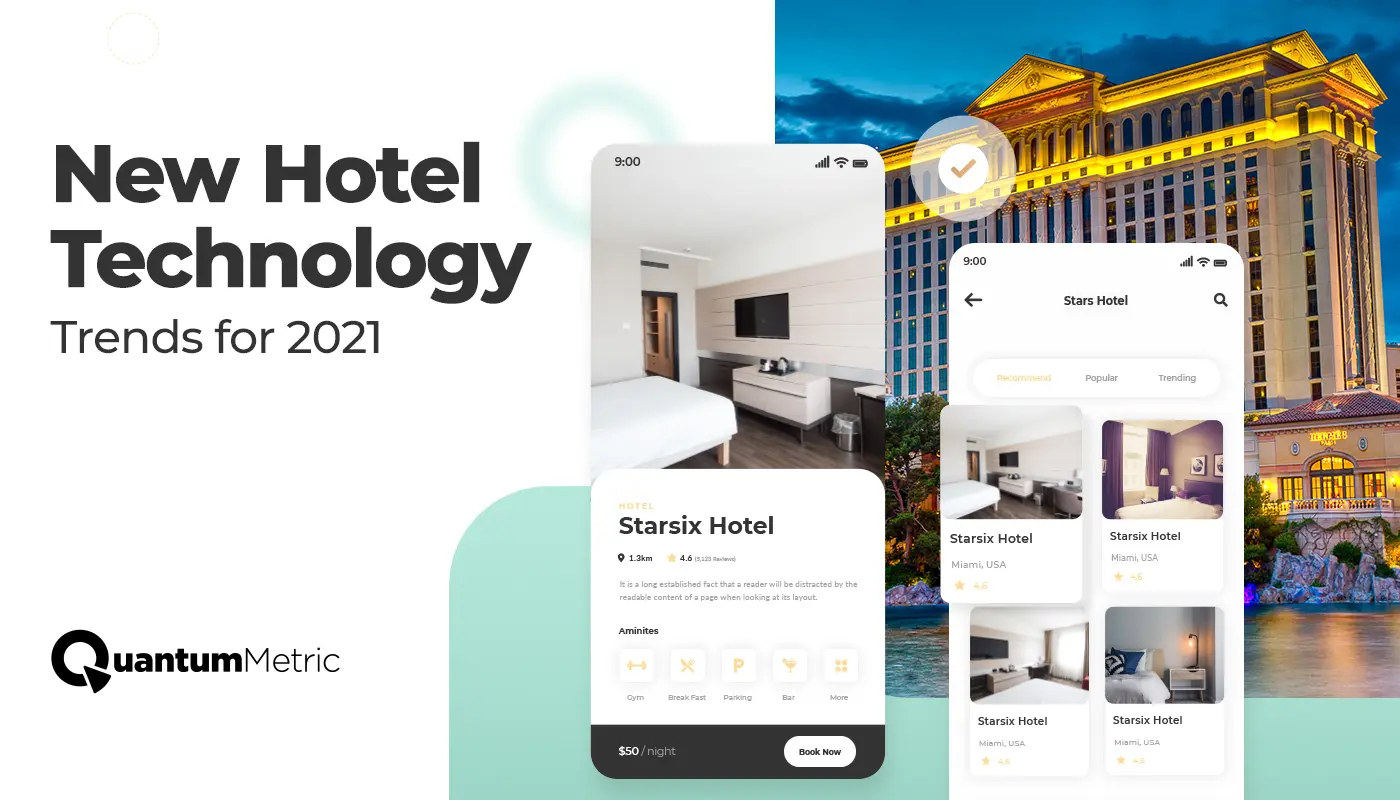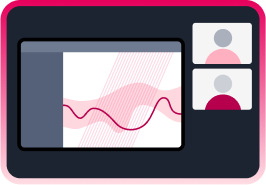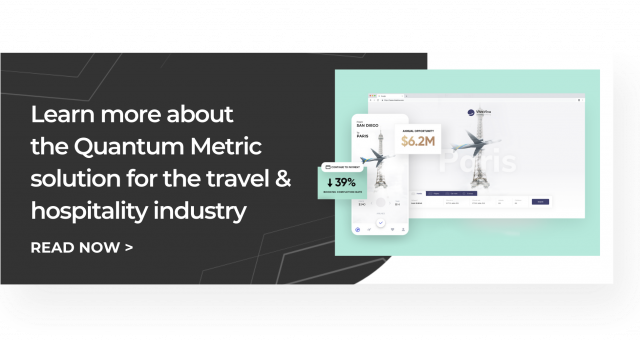New Hotel Technology Trends for 2021

Despite being one of the largest and most dynamic segments of the US economy, the hospitality sector–and the hotel industry in particular–has largely resisted investing in technology. For decades hoteliers have focused on offering standout in-person customer service, such as friendly faces at guest check-in and valet parking. Keeping up with new technology trends in the hotel industry will help hoteliers remain competitive in our digital-first world.
As hotels rebound from the pandemic, they will need to take on competition from “hometel” competitors like Airbnb and Sonder. For hotels, this means modernizing the IT infrastructure and addressing any tech debt that has accumulated over the past few years. Too many hotel CIOs invest all of their energy in building an IT infrastructure for backends and databases, without paying any attention to the apps that their customers actually use. The fact of the matter is that hotels must focus on both at the same time.
Hotels still have a journey before they return to their pre-pandemic levels of business and leisure travel. Occupancy rates are slowly and steadily returning to normal, which gives hoteliers ample time to revamp their tech stack and prepare to offer superior digital experiences across their digital portfolio, especially on mobile devices.
Some major tech changes in hotel operations include a boom in SaaS investments, APIs, new tech tools for guests, AI & machine learning, and more. The future of hotels, then, is not necessarily becoming tech companies. Instead, hotels should think about becoming tech enabled so that they can deliver superior guest experiences. After all, hotels can’t simply send all of their guests to the cloud.
Here’s a look at the digital experiences that hotel guests are looking for, and how hotels can go about modernizing their tech stacks to adapt to new technology trends in the industry.
Building enhanced guest-facing applications and services
Hotel guests have grown accustomed to using applications and services such as booking engines and messaging platforms. Today’s customers want to be able to book their hotel stay right from their mobile devices, without any friction. As soon as they arrive at the hotel, guests want to be able to communicate with hotel services quickly and efficiently, such as room service and other amenities. Facilitating messages between guests and hotel services allows the hotels themselves to gather real-time feedback and can even encourage people to post reviews on social media. This is just the beginning of new hotel technology trends for a post-pandemic world.
Contactless experiences and other new hotel technology trends
Covid-19 has further exacerbated the need for contactless solutions in hotels. Now, hotels are turning to mobile applications to help customers with online check-in and contactless room delivery service, similar to services offered by DoorDash and Uber Eats. IHG, for instance, offers digital check-in and check out, which allows guests to set up alerts for check-in, select arrival time, pay their bills, and more.
Like airlines, hotels are also enabling guests to stream directly from their phones, tablets, and other devices onto hotel TVs. Mobile applications for stream place more control in the hands of guests, allowing them to touch fewer external devices during their stay.
Commitment to guest safety
In the post-Covid era, safety and hygiene will be top of mind, even as travel begins to resume to previous levels.
Currently, hotels have to manage new cleaning processes, maintain social distancing protocols, and keep guest interactions in public spaces to a minimum, depending on each state’s mandate. Keeping up with guests on digital channels helps to ensure that all necessary safety measures are communicated effectively.
Hotels can also leverage new digital channels to communicate changes to employees. One of the challenges facing hotels is that many of their frontline workers are contractors, which means they don’t have company email addresses. Digitization can help keep all employees informed as well as overcome language barriers, for both guests and employees.
Covid-19 passports
Like some airlines, Hyatt Hotels Corp. is reportedly debating whether they use VeriFLY to help ensure that guests are vaccinated before using gyms, bars, restaurants, and business meeting sites.
Experts are debating the efficacy of this approach. However, some public health officials believe that Covid-19 passports could help people get back to business meetings, conventions, sports games, and concerts
Building your tech stack
But to offer standout digital experiences, hotels need to thoughtfully invest in, and build, their tech stack.
Hotel chains like IHG are taking advantage of a hybrid cloud environment to offer top notch web design across their digital portfolio, including computers, tablets, and smartphones. Their goal? Offer a frictionless experience.
New cloud-based technology companies like Cloudbeds and Mews Systems are receiving attention from investors. Cloudbeds, for example, offers tools for property management, channel management, bookings, revenue, and automating workflows for thousands of properties. Mews Systems, on the other hand, offers tools that assist with automating and running the hotel’s day-to-day operations.
And that’s just scratching the surface.
Integrating APIs
More hotels are integrating their tools and programs by using API technology. This might involve connecting your RMS to a PMS, or business intelligence tools to a PMS. With the help of APIs, your tech stack becomes more user-friendly and efficient, allowing you to capitalize on each platform’s full potential.
More hotels have started using API technology to analyze guest data. Being able to analyze this data can help organizations launch better marketing campaigns, monitor travel trends across seasons and locations, automate time-consuming data entry tasks, and make important staffing decisions on a tight budget.
Protecting and leveraging hotel guest data
Everyone from your ordinary vacationer to well known celebrities stay in hotels. Given that famous, wealthy, and other important people stay in hotels while traveling, hotel systems are a prime hacking target. An infamous data breach at MGM led to leaked information on celebrities, CEOs of well known tech companies, reporters, government officials, and other public figures.
Now let’s say hotels do have technologies in place to protect against cyber attacks. Hotels can then leverage guest data, and especially guest profiles, to provide a personalized experience for guests. Larger hotel chains can also dip into data collected by PMS’s or CRM’s to analyze larger trends, such as how many guests take advantage of streaming services on their mobile devices.
Aligning on priorities
Some hotels are like mini cities, with so many different offerings. Waterparks. Casinos. Spas. Business Centers. Buffets. Name a service, and some hotel probably offers it.
With so many different business units in play, hotel chains struggle to maintain a unified version of their data.
The problem becomes further exacerbated when teams such as product, design, engineering, IT/Ops, and marketing remain siloed from one another, with their individual understanding of customer data.
Platforms like Quantum Metric tackle the problem of alignment head on by providing one unified view of data – one version of truth.
Overcoming lack of trust in IT by breaking down organizational silos
One of the new new hotel technology trends is an ongoing distrust in IT, or at least IT’s relationship with the business side of things. Many hotels have an ambivalent view of IT, which has historically slowed down digital transformation efforts.
But it’s important to remember that IT decisions (from choosing a new third-party vendor to legacy application replatforming) are in fact business decisions.
Quantum Metric tackles this problem head on by quantifying the business impact of each product decision, from the items in the design backlog to technical errors that need to be addressed.
When product, marketing, engineering, CX, DevOps, IT, and other teams know the business impact of their product decisions, they can align on priorities and make decisions that drive conversion rates, generate revenue, and most importantly, leave hotel guests satisfied.









